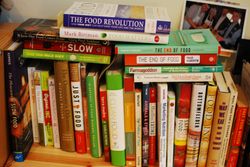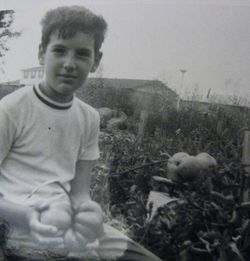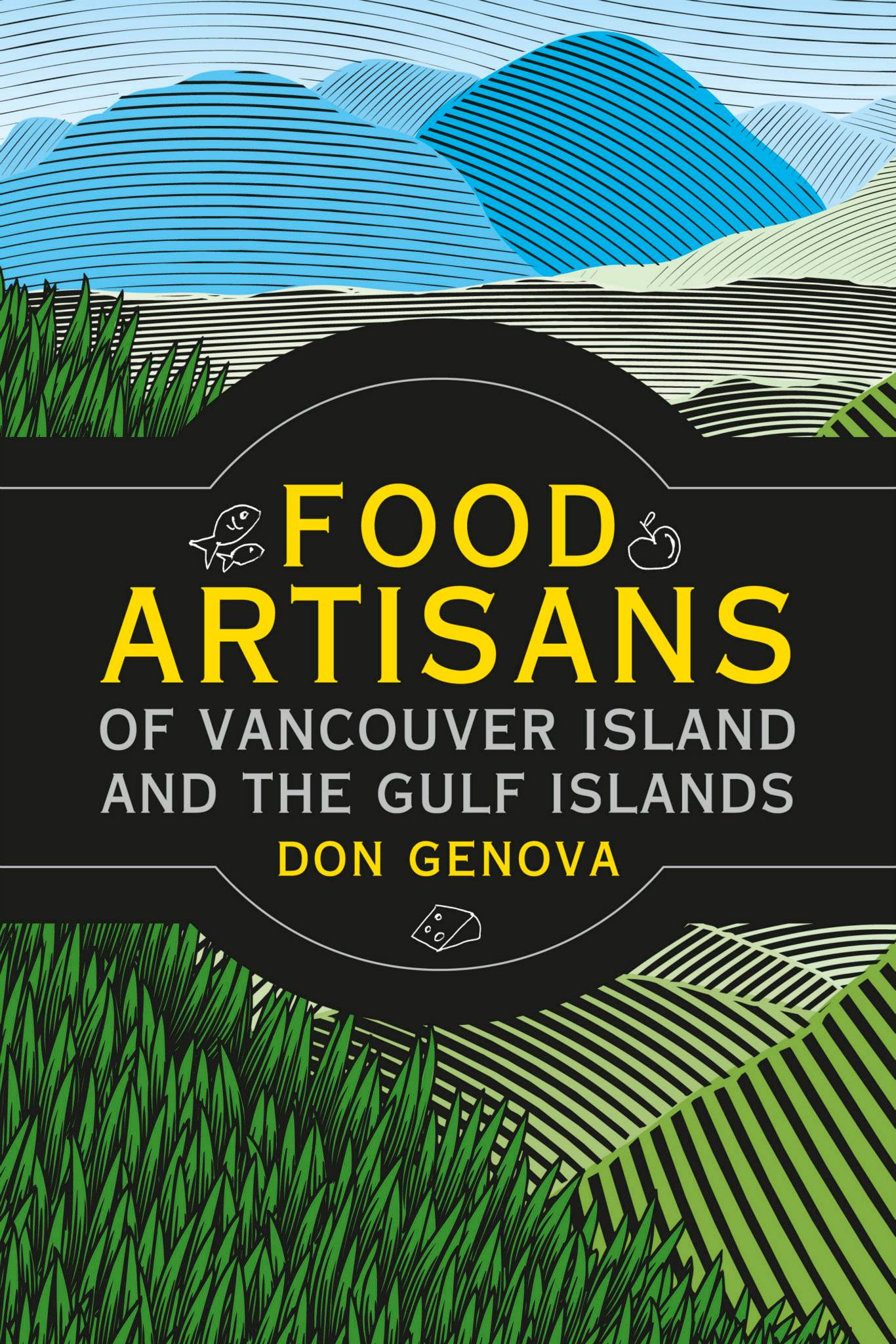 These are just a few of the great books I've been collecting over the past few years that have helped me get a handle on how to 'green' my grocery list. The books are just part of my teaching arsenal I'm preparing for a brand-new, online course starting next week through the Culinary Arts Department of UBC's Continuing Studies.
These are just a few of the great books I've been collecting over the past few years that have helped me get a handle on how to 'green' my grocery list. The books are just part of my teaching arsenal I'm preparing for a brand-new, online course starting next week through the Culinary Arts Department of UBC's Continuing Studies.
 When I was a kid I didn't have to worry too much about where my food came from, most if it came from our backyard! My mom and dad were especially good at growing tomatoes, as you can see in this photo, which was taken sometime in the late '60's, I think.
When I was a kid I didn't have to worry too much about where my food came from, most if it came from our backyard! My mom and dad were especially good at growing tomatoes, as you can see in this photo, which was taken sometime in the late '60's, I think.
These days, when additives and processed foods fill shopping carts, many of us are now choosing to purchase organic vegetables, or sustainably-caught fish, what do words like 'organic' and 'sustainable' really mean? In my course, Greening Your Grocery List, I'll help you discover the true meaning of the words used to market a meal or the products in your grocery store. I'll get you to delve into the mysterious world of labeling, advertising and carbon footprints. While there is some reading to do every week, the fun part of the course is when I send you beyond your computer screen to ask some to some of your own investigations at farmers markets, the butcher shop, fish mongers and more. Your findings will be shared with other students in online forums.
The course runs April 13th to May 11th and I'd love to have you along for the ride. And if you think you are already up on your sustainable shopping, why not tell a friend you know who is trying to change their eating lifestyle? The cost is just $225 plus tax, you can just click here to register.



Hi Don
I took quite a few of your classes at the Thrifty’s in Victoria. I wondered if you would want to send information about this event to your contacts. It would be incredible to see one of these models used to fund local grain. Maybe the local bakeries could get together to take it on.
Invest Your Money in Local Change
A forum on present and future options for putting savings, RRSPs and investment dollars into local, sustainable, ethical businesses to build a more self-reliant economy.
“Converging Global Crises and the Benefits of Local Investment Models for Businesses and Communities” –Nicole Chaland, Sustainability Solutions Group, Program Director for Simon Fraser University Certificate Program for Community Economic Development
“Challenges and Possibilities for Ethical, Local Investing” –Stephen Whipp, CFP, Senior Financial Advisor with Stephen Whipp Financial and Manulife Securities Incorporated, specializing in Socially Responsible Investing and Financial Planning’ vice president Westshore Chamber of Commerce
“Building Affordable Housing and Social Enterprises with Community Investment Bonds” –Rupert Downing, Executive Director of the Community Social Planning Council of Greater Victoria, former director of the Canadian Community Economic Development Network
“Invest in Community Impact through Banking Locally” –Rebecca Pearson, MBA, Account Manager, Vancity Community Business Banking
“Food Security through Community Supported Agriculture” –John Ehrlich, Owner/manager of Alderlea Farm & Cafe, and Farmer at TLC’s Keating Farm in Duncan
“We need each other to flourish: Small Investments, Big Paybacks through Local Investments” –Lisa Helps, City of Victoria Councillor, Executive Director of Community Micro Lending
Admission Free
7 p.m. Tuesday, January 31, 2012
Ambrosia Conference Centre
638 Fisgard St. Victoria, BC
sponsored by Transition Victoria, Vancity and Focus Magazine
Don
I was listening to CBC podcast re Eating Green. Sure appreciate how you bring all the issue together and help the consumer make their choice!
With regard to Mexican organic produce and water I was given to understand that the Mexican government exercises more control over their water table than the California State government. In Mexico if the water table gets too low seawater will flow back into the aqua fir. This leads to more conservative/sustainable use of water than in California. Mexican farmers also have much more experience growing with less water than their American counterparts.
The other issue when deciding between US and Mexican organic produce is the mode of transportation. California produce is trucked up to Canada. Mexican organic produce is now be brought into the port of Vancouver on container ships . When running the stats on bananas (direct to Vancouver from Peru in this case) through the Climate Smart C02 calculator the emissions are halved.
For me the other important issue is Fair Trade. Discovery Organics in Vancouver is working with Mexican co-ops and encouraging their partners to certify as Fair Trade as well! Having a positive socio economic impact on farms is very important! Even our grain farmers here in Canada have become fair trade to get a living wage!
http://farmerdirect.coop/
Looking forward to your green washing interview on CBC today.
Susan
Share Organics – Local and Organic – Sustainably Delivered